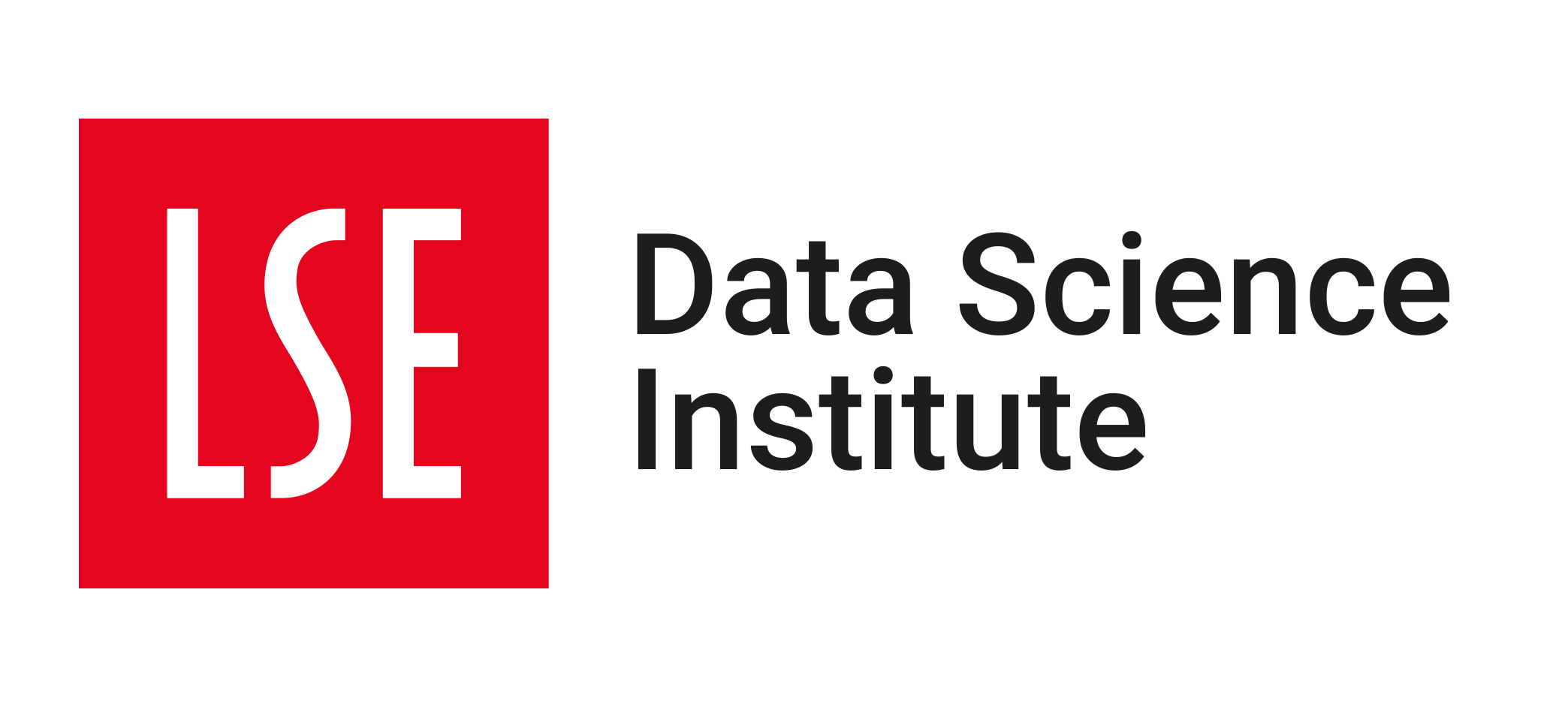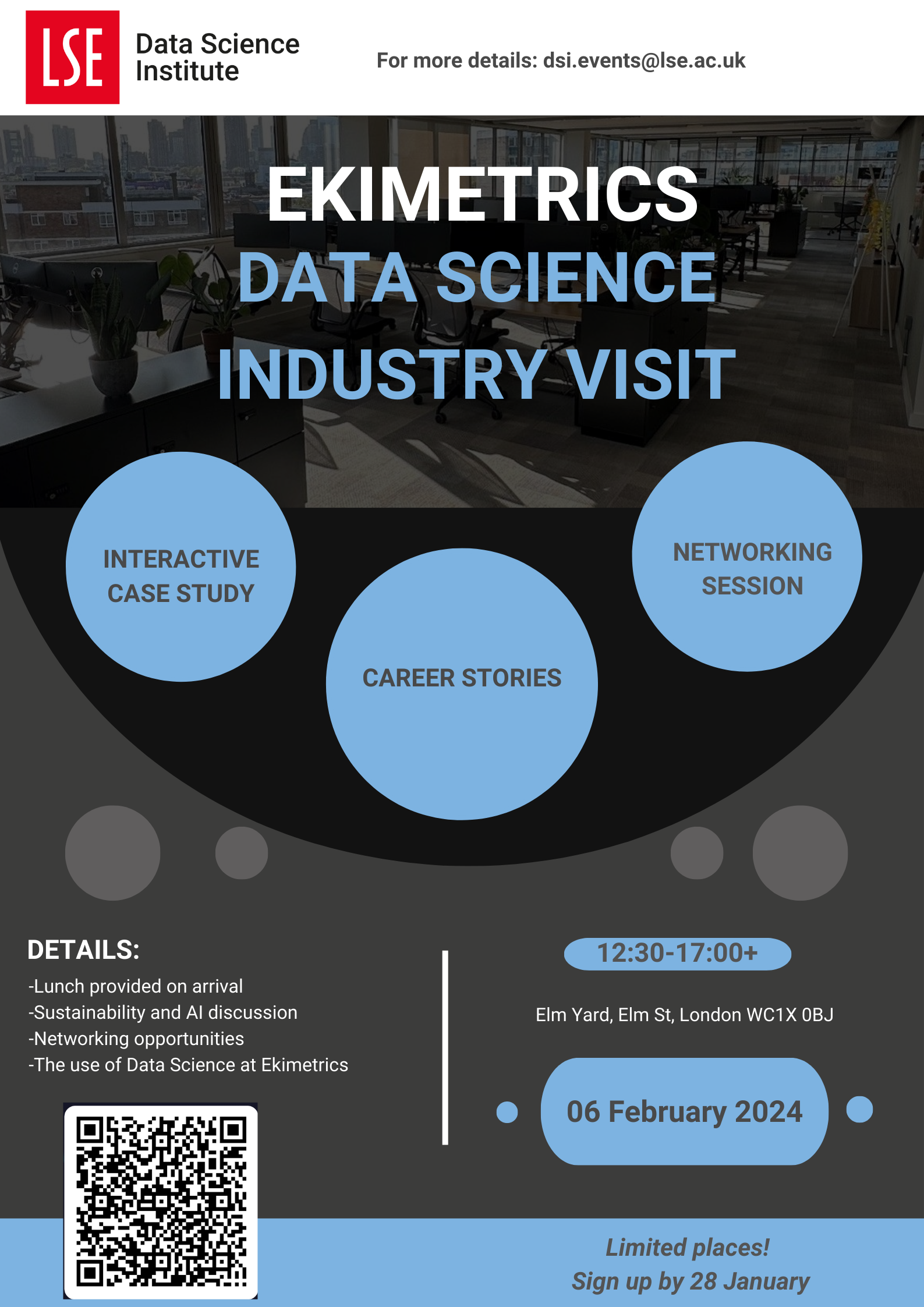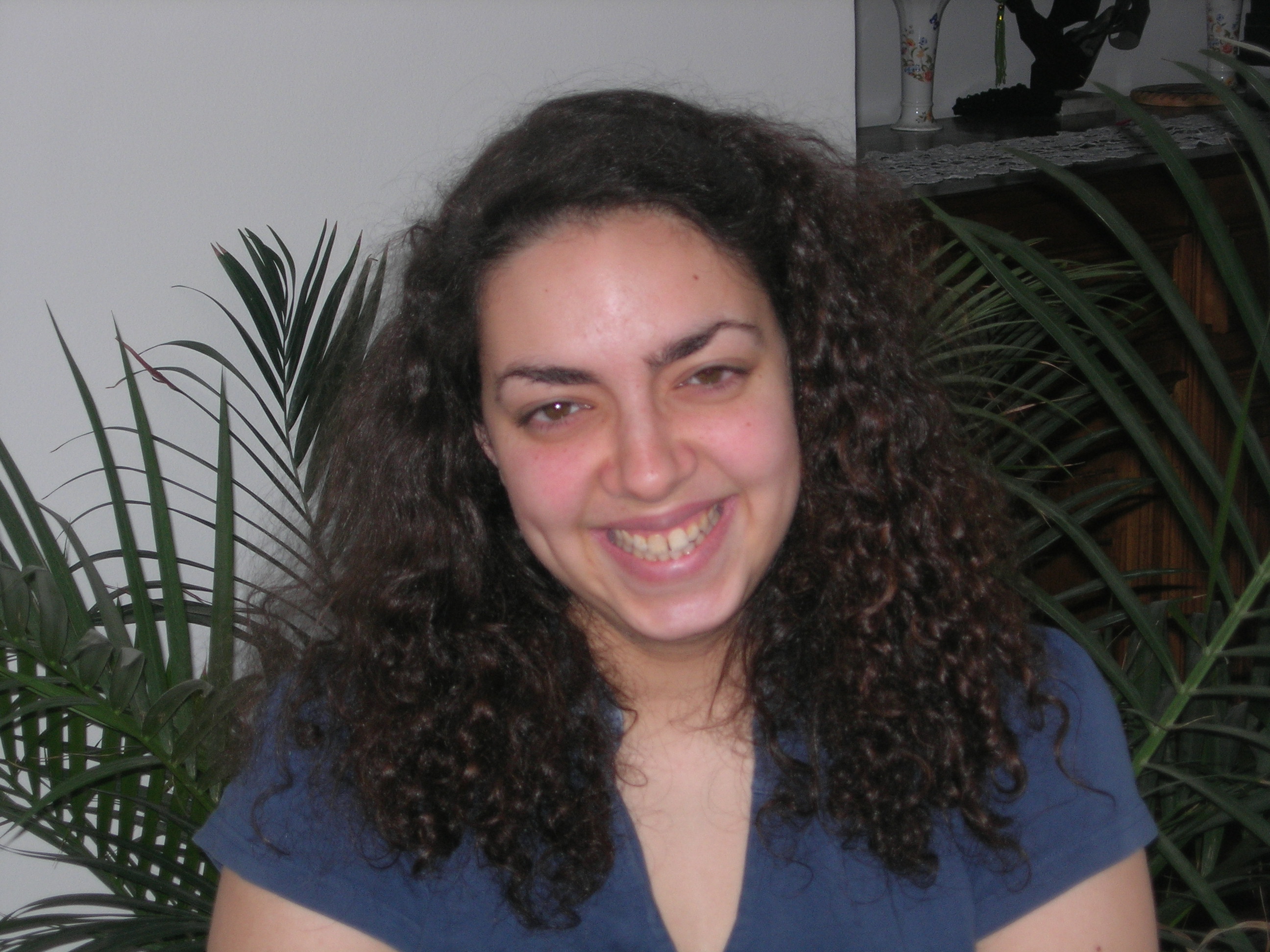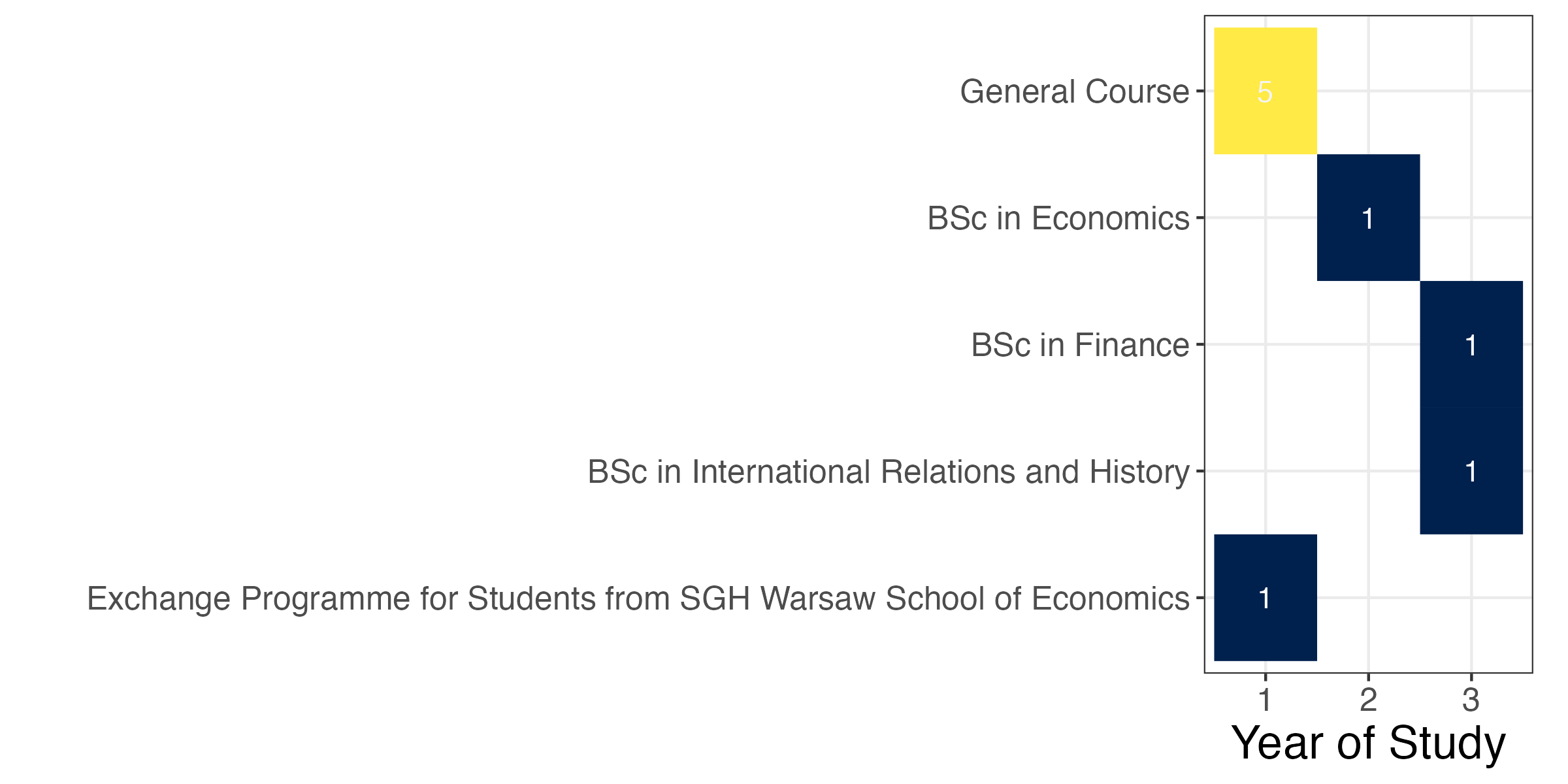🗓️ Week 01
Structure of this course
DS101 – Fundamentals of Data Science
15 Jan 2024
Who we are
The Data Science Institute

- This course is offered by the LSE Data Science Institute (DSI).
- DSI is the hub for LSE’s interdisciplinary collaboration in data science
Sign up for DSI events at lse.ac.uk/DSI/Events
The Data Science Institute

Activities of interest to you:
- CIVICA Seminar Series
- Careers in Data Science
- Social events
Sign up for DSI events at lse.ac.uk/DSI/Events
The Data Science Institute

Activities of interest to you:
Industry “field trips” (next up: Ekimetrics on February 6th and Lloyds on February 20th)
Summer projects
Sign up for DSI events at lse.ac.uk/DSI/Events
Other resources of interest to you
Our courses
DSI offers accessible introductions to Data Science:
DS101
Fundamentals of
Data Science
🎯 Focus:
theoretical concepts of data science
📂 How:
reflections through reading and writing
DS105
Data for
Data Scientists
🎯 Focus:
collection and handling of real data
📂 How:
hands-on coding exercises and a group project
DS202
Data Science for
Social Scientists
🎯 Focus:
fundamental machine learning algorithms
📂 How:
practical use of ML techniques and metrics
Your lecturer

Assist. Prof. (Education)
LSE Data Science Institute
- PhD in Computer Science (University of Twente, Netherlands)
- Background: Engineering, Databases, Health Informatics, ML for cybersecurity
- Formerly Research Associate at King’s College London and the University of Edinburgh (School of Informatics)
decision support systems
machine learning applications
databases
provenance
ethical AI/XAI
Teaching Assistants

Data Science Trainer
LSE Digital Skills Lab
- MSc Applied Social Data Science
- Qualified Assistant Professor in Sociology (MA, Jawaharlal Nehru University, New Delhi)
- Background: Statistics in social sciences, Data Analytics, Literature, Social Systems
data in public policy
machine learning
cloud computing
quantitative research
Causal Inference
Who you are
| Programme | Freq |
|---|---|
| General Course | 5 |
| BSc in Economics | 1 |
| BSc in Finance | 1 |
| BSc in International Relations and History | 1 |
| Exchange Programme for Students from SGH Warsaw School of Economics | 1 |

Source: LSE For You. Last Updated: 15 January 2024
How did we get here?




How did we get here?




The current abundance of data is strongly associated with the dramatic changes in technology in the past few decades.
Smartphones 📱 are a very recent thing

To interact with this plot, check reference (Fischer-Baum 2017) at the end of this presentation.
We changed how we consume music 🎧

To interact with this plot, check reference (Fischer-Baum 2017) at the end of this presentation.
We changed how we consume video 🎞️

To interact with this plot, check reference (Fischer-Baum 2017) at the end of this presentation.
We spend a lot more time connected
… and our social media habits keep on changing

… and our social media habits keep on changing

The possibilities
- Humans and machines nowadays generate A LOT of data ALL THE TIME
- It has become very cheap to collect and store this data
- This abundance of data opens up new possibilities for research & policy-making
New data to answer old questions:
- How do rumours spread?
- How can we predict unemployment rates accurately?
New questions enabled by new data/new technologies:
- Is social media a threat to democracy?
- Is generative AI a threat to the job market?
What do we mean by data science?
Data science is…
“[…] a field of study and practice that involves the collection, storage, and processing of data in order to derive important 💡insights into a problem or a phenomenon.
Such data may be generated by humans (surveys, logs, etc.) or machines (weather data, road vision, etc.),
and could be in different formats (text, audio, video, augmented or virtual reality, etc.).”
The mythical unicorn 🦄
knows everything about statistics
is a fluent computer programmer
fully understands businesses like no one
able to communicate insights perfectly
In practice…
We are all jugglers 🤹
- We need and work in multi-disciplinary teams
- Everyone brings distinct skill sets
- Good data scientists know a bit of everything.
- Not fluent in all things
- Understand their strengths and, more crucially, their weaknesses/shortcomings
- They know when and where to interface with others and ask for support

The Data Science Workflow
The Data Science Workflow
The Data Science Workflow
It is often said that 80% of the time and effort spent on a data science project goes to the abovementioned tasks.
The Data Science Workflow
- This is the bit that typically gets everyone excited about data science.
- Machine Learning is a sub-field of Artificial Intelligence that focuses on developing algorithms that can learn from data.
What do you think of this photograph?

Boris Eldagsen’s award-winning picture “Pseudomnesia: The Electrician” at the Sony world photography awards.
An algorithm created this photograph!
- Instead of using a 📷, the author typed a few words (called a prompt) into an algorithm
- It took him ⌛ some time and effort to find the “right words” to express his idea: the image was was re-edited between 20 to 40 times.


- Boris Eldagsen used a generative Artificial Intelligence (AI) algorithm called ‘DALL-E 2’

Source: Williams (2023)
Eldagsen’s position on generative AI:
- he does not consider the process of building an AI image a dehumanised one or one where the human is sidelined:
- “I don’t see it as a threat to creativity. For me, it really is setting me free. All the boundaries I had in the past – material boundaries, budgets – no longer matter. And for the first time in history, the older generation has an advantage, because AI is a knowledge accelerator. Two thirds of the prompts are only good if you have knowledge and skills, when you know how photography works, when you know art history. This is something that a 20-year-old can’t do.”
- he instead worries about fake images and the threat to democracy:
- “The threat is to democracy and to photojournalism; we have so many fake images, we need to come up with a way to show people what is what.”

Source: Grierson (2023)
Eldagsen’s position on generative AI:
he refused the photography award and says he “applied as a cheeky monkey” to find out if competitions would be prepared for AI images to enter. “They are not,” according to him.
“We, the photo world, need an open discussion. A discussion about what we want to consider photography and what not. Is the umbrella of photography large enough to invite AI images to enter – or would this be a mistake? With my refusal of the award I hope to speed up this debate.”
“AI images and photography should not compete with each other in an award like this. They are different entities. AI is not photography. Therefore I will not accept the award.”
⏭️ Let’s look at a few other examples
Threading a fine line with AI…
Threading a fine line with AI…

Source: Naughton (2023)
Threading a fine line with AI…
(Unsolved) questions about the (generative) AI revolution
Who owns the rights to the images?
“An impressionist revolutionary cat on a roof”

What biases do these tools propagate?

“A cat on the moon holding a box with the source of true wisdom and happiness; cubism style”
Do these tools impact on people’s choices, autonomy or human dignity?

“A dignified cat thinking hard about existential questions, Van Gogh painting”
Are these tools safe?
“A silly cat on the moon holding a box with the source of true wisdom and happiness; Dutch realist painting style”

Time for a break 🍵

After the break:
- DS101W website
- Syllabus
- Assessments
- Tools
- Course rep
- This week’s coursework
References

LSE DS101W (2023/24) – Week 01 | archive




